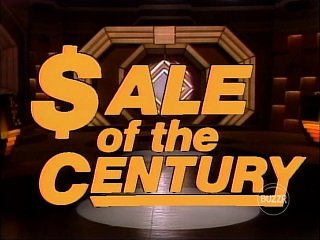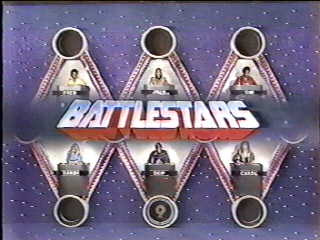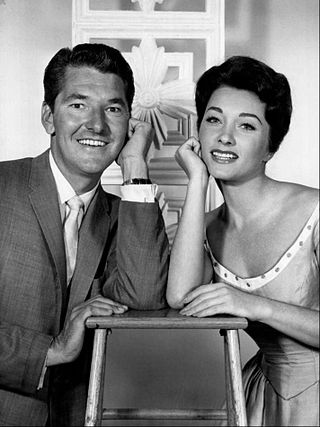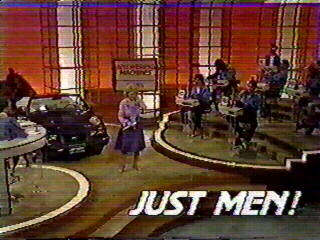Related Research Articles

The Weakest Link is a British television quiz show, mainly broadcast on BBC Two and BBC One. It was devised by Fintan Coyle and Cathy Dunning and developed for television by the BBC Entertainment Department. The game begins with a team of nine contestants, who take turns answering general knowledge questions within a time limit to create chains of nine correct answers in a row. At the end of each round, the players then vote one contestant, "the weakest link", out of the game. After two players are left, they play in a head-to-head penalty shootout format, with five questions asked to each contestant in turn, to determine the winner.

Hollywood Squares is an American game show in which two contestants compete in a game of tic-tac-toe to win cash and prizes. The show originally aired as a pilot on NBC in 1965, and debuted on that network as a regular series in October 1966. The board for the game is a 3 × 3 vertical stack of open-faced cubes, each occupied by a celebrity seated at a desk and facing the contestants. The stars are asked questions by the host and the contestants judge the truth of their answers to gain squares in the right pattern to win the game.

Match Game is an American television panel game show that premiered on NBC in 1962 and has been revived several times over the course of the last six decades. The game features contestants trying to match answers given by celebrity panelists to fill-in-the-blank questions. Beginning with the CBS run of the 1970s, the questions are often formed as humorous double entendres.

Eye Guess is an American game show created by Bob Stewart and hosted by Bill Cullen that aired on NBC from January 3, 1966, to September 26, 1969. The game combined a general knowledge quiz with a Concentration-style memory element, in which the answers were shown to the players and their recall of their positions was tested.

Sale of the Century is an American television game show that originally debuted on September 29, 1969, on NBC daytime. It was one of three NBC game shows to premiere on that date, the other two being the short-lived game shows Letters to Laugh-In and Name Droppers. The series aired until July 13, 1973, and a weekly syndicated series began that fall and ran for one season.

The Magnificent Marble Machine is an American television game show. Contestants partnered with celebrities to answer trivia questions and gain control of an oversized pinball machine. The program premiered on NBC on July 7, 1975 at 12:00 pm ET, replacing the short-lived game show Blank Check.

Dream House is an American game show that saw contestants competing to win, as the title of the show indicates, a new house. The show originally premiered in primetime on ABC on March 27, 1968, with a daytime edition premiering on April 1, 1968. The primetime series aired weekly until September 19, 1968, and the daytime series aired daily until January 2, 1970, when it was replaced with All My Children. The daytime series was revived for NBC's daytime schedule and premiered on April 4, 1983, running until June 29, 1984.
It's Academic is an Australian children's game show which is based on the long-running American version of It's Academic, and pits students from different schools against each other in a test of knowledge covering a number of diverse subjects including English, mathematics, science, geography, sport, music and popular culture.

Battlestars is an American game show that aired on NBC during the 1980s. The program's concept was developed and produced by Merrill Heatter, featuring a six-celebrity panel. The object of the game is to "capture" the celebrities by lighting up numbers positioned around triangle shapes, inside of which sat each panelist. Similar to Hollywood Squares, which Heatter also co-created and produced, the celebrities are asked questions by the host, and the contestants judge the truth of their answers in order to light up the numbers.
Celebrity Sweepstakes is an American television game show that aired on NBC's daytime schedule from April 1, 1974, to October 1, 1976. The show also had two separate weekly syndicated runs from September 9, 1974, to September 1975 and again from September 20, 1976, to May 23, 1977.

Video Village is an American television game show produced by Heatter-Quigley Productions, which aired on the CBS network in daytime from July 11, 1960, to June 15, 1962, and in primetime from July 1 to September 16, 1960. It was notable for the use of its unique "living board game" concept and for premiering soon after the quiz show scandals.

Just Men! is an American game show that aired on NBC Daytime from January 3 to April 1, 1983. The show starred Betty White, who won an Emmy award for her work on the show, with Steve Day announcing. It pitted two female contestants who were asked to predict answers to a series of yes/no questions posed previously to a panel of seven male celebrities.
Sale of the Century is an Australian prime time game show that aired on the Nine Network from 14 July 1980 to 29 November 2001. It is based on both Great Temptation that aired from 1970 to 1974 and on the original Sale that first aired in the United States from 1969 to 1973. The Australian format of Sale has since been used internationally, including in a revived US version that aired from 1983 to 1989.
PDQ and Baffle are American television game shows created by Heatter-Quigley Productions. Both shows' objective was for contestant/celebrity teams to guess a given word or phrase in the shortest amount of time with the fewest letters given as possible.

Wheel of Fortune is a British television game show based on the American show of the same name created by Merv Griffin. Contestants compete to solve word puzzles, similar to those used in Hangman, to win cash and prizes. The title refers to the show's giant carnival wheel that contestants spin throughout the course of the game to determine their cash and/or prizes.

Break the Bank is an American game show created by Jack Barry and Dan Enright and produced by their production company, Barry & Enright Productions. It was the first game show packaged by Barry and Enright as a tandem since their fall from grace following the 1950s quiz show scandals.

BrainSurge is an American children's game show that aired on Nickelodeon and was hosted by Jeff Sutphen. The show taped its first season in February 2009, and debuted on September 28, 2009. The show's format was adapted from the Japanese game show Brain Survivor. The U.S. version was created by Scott A. Stone, co-creator of Legends of the Hidden Temple, and Clay Newbill, executive producer of The Mole.

Fifteen to One is a British general knowledge quiz show broadcast on Channel 4. It originally ran from 11 January 1988 to 19 December 2003 and had a reputation for being one of the toughest quizzes on TV. Throughout the show's original run, it was presented and produced by William G. Stewart. Thousands of contestants appeared on the programme, which had very little of the chatting between host and contestants that is often a feature of other television quiz shows.
Make Me an Egghead is a British quiz show on BBC Two presented by Jeremy Vine. It was a spin-off from Eggheads with the goal to find two further Eggheads, one male and one female, to complement the existing team of seven. It ran from 22 August to 23 September 2016 and was won by Steve Cooke and Beth Webster. A similar show, Are You an Egghead?, aired in 2008 and 2009.
Funny You Should Ask is a syndicated American game show that launched in 2017. It is distributed by Entertainment Studios and hosted by Jon Kelley. Reruns air on the Entertainment Studios cable television channel Comedy.TV and through syndication.
References
- ↑ Hyatt, Wesley (1997). The Encyclopedia of Daytime Television . Watson-Guptill Publications. p. 170. ISBN 978-0823083152 . Retrieved 22 March 2020.
- ↑ "Schenectady Gazette - Google News Archive Search". news.google.com.